The Perspective of PhD Candidates
The PhD journey: A shared responsibility

The PhD journey: A shared responsibility



For us, training doctoral students is a joyful duty of collaborative research, an opportunity for critical discourse and a responsibility at the same time. With almost 600 doctoral students, the doctoral programs represent a significant part of our work. In the context of the Global School in Empirical Research Methods (GSERM), we do not only train our own doctoral students but have established ourselves as one of the leading European doctoral schools for external doctoral students. Doctoral education that meets national and international quality standards is a key objective for the new Rectorate that took office in 2024. For this reason, we have initiated the second edition of this brochure, which has proven popular and important both within and outside our university.
Since the first edition of this brochure in 2019, significant developments have occurred within the HSG doctorate. In addition to improved employment conditions and external appraisal of the thesis, from February 2024 onwards, all new PhD students enter a PhD agreement with their supervisors. This agreement is an essential component of the embodied shared responsibility of the doctoral process, of which we are all deeply convinced.
We thank the authors of this brochure, Florian Schulz and Katharina Molterer, most warmly for their tremendous engagement for doctoral students, and wish all doctoral students and their supervisors an inspiring collaboration, as well as much joy and pleasure within the mutually shared responsibility of their research project.
This brochure presents a co-constructive supervision model for PhD students and PhD supervisors. The model highlights the principles of transparency, cooperation and ethically informed professionalism.
The brochure rests on our firm conviction that the PhD process is a shared responsibility between PhD supervisors and PhD candidates. We also believe that maintaining high work satisfaction and a positive work relationship throughout the process will positively affect the quality of the thesis. We therefore underline the importance of transparent communication, the clarification of expectations, a shared understanding of rights and privileges and sensitivity to possible role conflicts.
A PhD process typically has several stages, each with unique issues and challenges that must be continuously addressed and clarified. While many of these issues and challenges apply to any PhD process, some are related to the specific supervision framework at the University of St.Gallen. Given the complexity of the PhD process, this brochure sets forth to provide a comprehensive framework and practical guidance for each of the stages.
Supplementing the university's official guidelines, the brochure offers both supervisors and candidates the possibility to develop a tailor-made supervision strategy in accordance with their ideals, specific areas of research, institutional requirements and personal preferences. Notably, the brochure focuses on building the dyadic work relationship between PhD supervisors and PhD students. It does so even if we are aware integrating others into the PhD process is often a key to success and can help mitigate many possible role conflicts.
Good academia relies on good relationships. They are a source of motivation and learning and a space where ideas and feedback are shared. Yet, building and maintaining good academic relationships is no trivial task and needs continuous effort. Here, our thanks go to all faculty who have invested time and effort in building a positive PhD support culture at the University of St.Gallen. We especially thank Fiorella Schmucki and Sabrina Helmer for their ongoing initiative and for making the second edition of this brochure possible.
Dr. Florian Schulz
Head of the Psychological Counselling Services of the University of St.Gallen
Dr. Katharina Molterer
Senior Psychologist at the Psychological Counselling Services of the University of St.Gallen
Please note
The brochure supplements the University’s official regulations and guidelines but does not substitute a close reading and use of these materials.
Academia has changed significantly in recent decades. While its key virtues, curiosity and knowledge creation, remain essential, the tempo of academic life has accelerated significantly. Its tasks and challenges have diversified. Today, academics are expected to build international networks, publish in highly competitive outlets, secure research funding, provide innovative and participatory teaching and facilitate academic programmes. They must often promote their research and demonstrate its positive impact on local and global communities. Finally, as digital technologies have created more flexible work conditions, combining in-presence with online communication and disconnecting from the never-ending workload has become a challenge that needs to be continuously managed. As an early phase of an academic career, the doctorate also requires skills beyond “only” writing the dissertation. It often demands effective project management, balancing multiple roles and responsibilities, creating collaborative networks and promoting one’s ideas to both a scientific and the general audience.
Against this backdrop, the PhD process can be seen as a socialisation process during which the PhD candidate acquires skills to complete the PhD project successfully – and beyond.
1 It's widely acknowledged that both PhD supervisors and PhD candidates hold responsibility for the PhD process and must devote time and effort to creating a good supervision relationship. Moreover, it is well known that positive PhD supervisor-student relations are associated with higher motivation levels and the overall quality of the submitted thesis. In contrast, poor relationships often negatively impact a candidate’s well-being or even lead to interrupting the doctoral project. 2 | 3 | 4
Thus, doctoral students must carefully consider how best to organise themselves and establish a good rapport with their supervisors as the basis of an effective and empowering PhD process.
Finally, PhD candidates should carefully consider their motivation and skills for a PhD and check if the work conditions, provided PhD supervision style and the overall context for the PhD are a good fit. Before committing to a PhD be sure to invest sufficient time and effort to clarify mutual expectations and roles and agree on these with the PhD supervisors, as this lays the foundations for the whole PhD process.
1 Wright, T., & Cochrane, R. (2000). Factors influencing successful submission of PhD theses. Studies in Higher Education, 25(2), 181-195.
2 Devine, K., & Hunter, K. H. (2017). PhD student emotional exhaustion: the role of supportive supervision and self-presentation behaviours. Innovations in Education and Teaching International, 54(4), 335-344.
3 Devos, C., Boudrenghien, G., Van der Linden, N., Azzi, A., Frenay, M., Galand, B., et al. (2017). Doctoral students’ experiences leading to completion or attrition: a matter of sense, progress and distress. European Journal of Psychology of Education, 32(1), 61-77.
4 Ives, G., & Rowley, G. (2005). Supervisor selection or allocation and continuity of supervision: PhD students’ progress and outcomes. Studies in Higher Education, 30 (5), 535-555.
Situated at the intersection between education and research, a doctorate qualifies candidates for research-based professions and enables them to take on diverse high-level responsibilities and functions. 5 The theoretical, methodological and social skills acquired during the PhD process open up interesting paths, such as translating research-based insights into problem-solving strategies benefitting practice or even society as a whole. During the PhD journey, doctoral candidates are early-stage researchers and young professionals who strive to “make a key contribution to the creation of new knowledge.” 6 Earning a doctorate requires ample time to become in-depth acquainted with stateof-the-art discussions in a specific research field and contribute to them. Before embarking on a PhD journey, candidates should be aware that completing a PhD requires about typically a minimum of three years of full-time academic work. Parallel to the PhD project PhD students often perform tasks at an institute or chair to get better insights in academia and to fund their doctorate.
Essential for a successful PhD journey is the acquisition and increasing mastery of research-related but also broader social and project management skills such as:
– Searching, reviewing, ordering and critically discussing large fields of knowledge and taking a nuanced stance.
– Breaking down complex tasks and deciding which activities to prioritise.
– Dealing with project phases in which developing solutions takes ample time and progress seems slow.
– Creating a reflective space for creative thinking and reviewing existing approaches.
– Balancing working independently and collaborating with others.
– Building positive work networks which allow one to share one’s work and receive feedback and support when needed.
Acquiring these skills is best possible when one is guided and can learn them from experienced others. This is why, throughout the PhD journey, PhD supervisors are key figures whose essential role is to help PhD students complete their PhD thesis.
5 Rectors’ Conferences of the Swiss Universities. (2015). Excellence through Research: Joint Position Paper by the Swiss Universities on the Doctorate. Bern: CRUS.
6 European University Association. (2010). Salzburg II Recommendations: European universities’ achievements since 2005 in implementing the Salzburg principles. Brussels: European University Association.
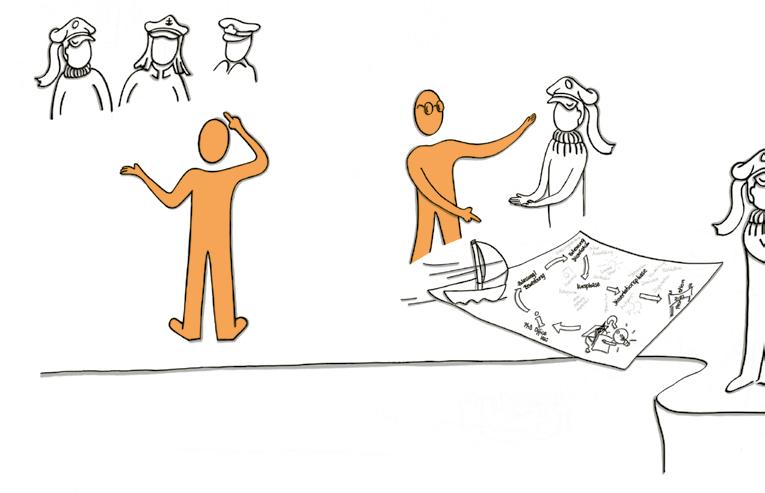
The planning, coordination and communication of the PhD process is no trivial task. To make the best of the mutual PhD journey, it is advisable to not only structure the process but to anticipate common challenges PhD students may face and find measures to address these, even before they occur.
Aside from the intellectual challenge of writing a PhD, establishing a sustainable and satisfying work process is key to success. A doctorate often involves working on your own for longer periods, during which immediate outcomes and progress may not be apparent. It is, therefore, crucial to stay motivated, strike a good balance between work and recreation and maintain positive social relationships. Especially when work just seems never-ending, it is imperative you balance your workload and keep in good spirits and health.
A completed and signed PhD agreement is a requirement to be admitted to all HSG PhD programmes (for further details please see the HSG research web). For a good reason: PhD agreements are widely acknowledged as a great tool for settling on shared expectations between PhD students and their supervisors and restructuring the process in an explicit and efficient manner. PhD agreements frame the PhD process, provide guidance and foster open communication about possible challenges. As such, they also help prevent potential interpersonal and structural tensions. As PhD processes hinge on multiple factors, regularly discussing and updating your PhD agreement may help structure the next steps. Engaging actively with the PhD agreement and drafting a version, which can then be discussed with PhD supervisors early in the process, can get the project off to a good start.
Enrolling as a PhD student at the University of St.Gallen subjects you to numerous academic regulations, such as the Award Regulations for Doctoral Degrees and the Code of Academic Integrity. Moreover, if you are employed at the University, you will also be subject to Cantonal Employment Regulations and specific employment regulations for PhD candidates. Familiarising yourself with these rules and provisions is your responsibility and helps you to better understand your rights and obligations. We also advise you to consult one of the University’s services when in doubt.
For PhD supervisors to be able to help you develop your thesis, they need to be acquainted with your thesis contents. Therefore, present your work as often as possible. Also, consider varying different presentation formats. Besides personal supervision, research colloquia and conferences are suitable formats for receiving feedback. If you intend to give a talk or presentation, we encourage you to involve your supervisor as early as possible in your planning. This means proactively scheduling a meeting with your supervisor or informing him or her about your plans. You may even send along your presentation for review. Importantly, be sure to prepare your meetings and presentations carefully. After the meeting, summarise the key points to enable feedback and future discussion on your progress.
The complexity of the PhD process requires careful tracking and thoughtful planning. While managing the PhD work process is always interlinked with developing the thesis contents, it makes good sense to regularly take a step back and consider if one’s time and project resources are distributed sensibly or if adjustments need to be made. As PhD students may find themselves deeply involved,
sometimes even lost, in the contents of their PhD thesis, PhD supervisors can help maintain and find clarity. Therefore, seek to update and consult your PhD supervisor on your work plan regularly, every three to six months. On this occasion, make sure to tell your supervisor which forms of support you need. Transparently talking about difficulties and uncertainties you face regarding the organisation of the project allows your supervisor to assist you in making suitable adjustments and finding a realistic and sustainable time plan.
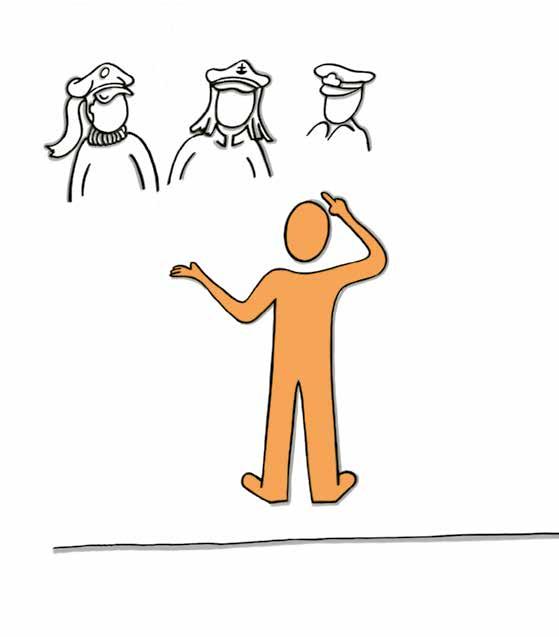
PhD students often perform multiple roles during their doctoral studies. Each role may involve specific requirements, skills, tasks and responsibilities.
Depending on your specific role in a situation, the tone and character of the relationship with your supervisor may change. This may cause role confusion and sometimes even role conflicts. Hence, be aware of your different roles and consider their boundaries.
To avoid role conflicts, consider the following preventive steps:
– Disclose | It is important you anticipate and discuss potential role conflicts with your supervisor. Addressing and helping clarify conflicts or tensions is a mutual endeavour, which we suggest you take into your own hands. Take any dissatisfaction or worries seriously and openly raise them with your supervisor instead of conveying them indirectly or only to others. You cannot assume that your supervisor will be aware of your feelings, so give them a chance to react to your concerns and to help you resolve matters.
– Agree | Make your different roles and your respective rights and responsibilities part of an extended PhD agreement. Also consider agreeing upon the frequency of meetings with your supervisor.
– Negotiate | Knowing and standing up for your rights is an important part of negotiating a workable solution with your supervisor. While this requires good preparation and some courage, it is an important step in emancipating yourself as a young academic.
– Demarcate | Draw clear boundaries between your roles, e.g. by allocating separate issues to separate meetings, or by taking a short break before moving on to issues concerning one of your other roles.
– Solicit | Request feedback on your different roles by preparing specific questions and by indicating your willingness to listen to feedback.
Roles of PhD students Main responsibility of the role
PhD student Organise, develop and execute thesis
Employee Deliver quality nonPhD work tasks
What can PhD supervisors expect? What can PhD supervisors expect?
Interest, time and effort to build academic skills as well as actively develop their thesis. Regular progress updates and discussion of critical issues. Organise well- prepared supervision meetings. Respect supervisor's time and agreed deadlines.
Take responsibility for assigned tasks and fulfil these as best as possible. Signal limits, challenges, and paths for development as early as possible to enable one’s superior to organise appropriate action.
Finding the right balance between working independently on the PhD and asking for support / sharing developments.
If the candidate is expected to demonstrate both academic and non-academic performance, and if time is scarce, confusion over priorities may arise. Professional short-term goals may also conflict with the long-term goal of completing the PhD.
Co-author Publish and learn to publish
Examination candidate Meet quality requirements of project proposal and PhD thesis
Authors will be mentioned in a sequence that fairly reflects their contribution. Learning how to manage publication processes and understanding the publishing business.
Candidate is familiar with the assessment criteria. Takes feedback on thesis development and the supervisor's grading decision seriously.
Candidates may feel they have no choice other than to add their supervisor as a co-author to gain support for their PhD or to avoid conflict, even though the supervisor made no substantial contribution to the paper.
The candidate's performance in non-PhD roles may lead to (fears of) biased thesis assessment.
Feedback is crucial and omnipresent in academic life. Nevertheless, giving and receiving feedback poses a significant challenge, even for the most experienced supervisor.
When you receive feedback, actively identify those parts best suited to progressing your project. Avoid taking feedback too personally. This also helps prevent emotional (over-) reactions. Focusing on substance provides the necessary distance to advance your project. The following feedback guidelines may help you improve how you give and receive feedback.
Fitting To be helpful, feedback needs to acknowledge the recipient's situation. It thus needs to be formulated comprehensibly and acceptably. When giving feedback, please ask yourself “Which kind of feedback might help this particular person in this particular situation.”
Be precise The more precise and concrete your feedback is, the better your counterpart can learn from you. Therefore, share your observations in detail before interpreting or assessing your counterpart's performance or before giving instructions. Moreover, substantiate your interpretations and avoid general evaluations (i.e. assessment not based on concrete observation or generalised characterisations of the person concerned).
Be personal Use the first person singular (“I”), not the voice of general truth (“one” or “you”). Indicate that your feedback is based on your (well-informed, yet subjective) perspective. Emphasise that you are not claiming to speak for the general public.
and
Receiving feedback may be difficult for various reasons: It might be delivered insensitively, not be the feedback you need or were hoping for, be overly critical, or be delivered at the wrong time and place. Nevertheless, integrating feedback into your academic project is crucial for further progress and growth.
As Table 4 illustrates, there are various kinds of feedback. Each may fulfil a different function in the PhD process. While each form of feedback is important, evaluative feedback will tend to override other forms of feedback when given together.
Fitting Please remember that feedback is subjective opinion, not the ultimate truth. Carefully consider what is helpful and right for you and select those aspects you find important.
Be precise Be prepared and, if possible, tell the person offering feedback which kind of feedback would be helpful at this point in time.
Be personal
Encourage your counterpart to share feedback by showing you are interested (i.e. adopt positive body language). Avoid defining and justifying yourself. If anything is unclear, seek clarification. At the end of the feedback, summarise the key points in your own words.
Function / Aims This form of feedback aims to encourage, motivate and empower the recipient by strengthening developmental trajectories and by emphasising existing strengths.
Example “Your presentation was very well prepared and executed; the progress in your project is becoming more and more visible.”
This form of feedback helps identify areas of development and helps the recipient best allocate their attention and energy.
“An important next step will be to make the argument in your literature section more coherent.”
This form of feedback aims to help the recipient align expectations, make informed decisions and orient themselves both towards others and towards norms and conventions.
“Considering the journal's standards, I believe your manuscript will be rejected in its present shape and form.”
Ask yourself the following
– Which kind of feedback will help me in the current phase of my PhD?
– How can I communicate what kind of feedback I want?
– How can I deal with unhelpful feedback in a constructive way?
7 Stone, D., & Heen, S. (2014). Thanks for the feedback: The science and art of receiving feedback well (even when it is off base, unfair, poorly delivered, and frankly, you’re not in the mood). Viking.
PhD students and their supervisors share a common journey until a PhD thesis is published. This journey often involves overcoming numerous challenges and uncertainties. The following practical advice for each of the phases of the PhD aims to help the PhD candidate and the academic work thrive and avoid shipwrecks, endless maelstroms and hurricanes.
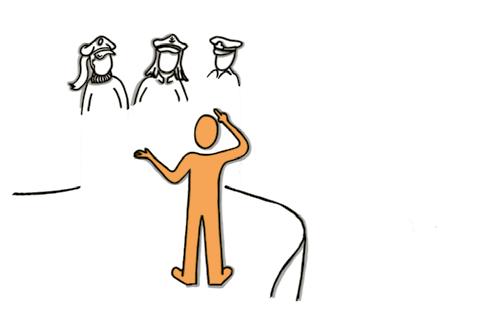
Coursework
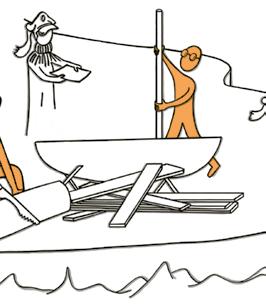
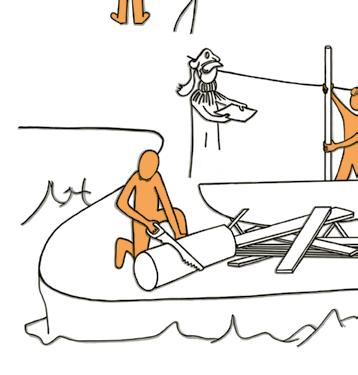
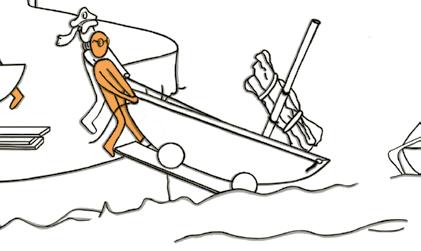

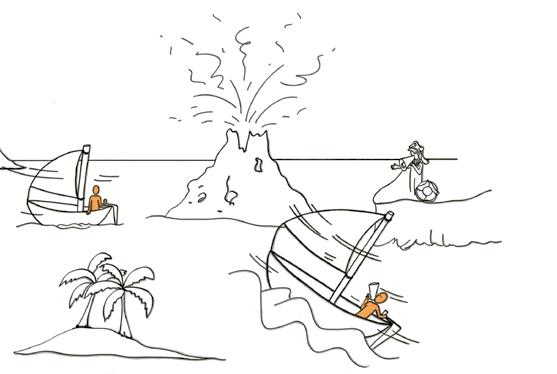

A PhD project is a long-term commitment. To make an informed decision whether to embark on this journey, you will need to carefully consider your motivation and resources. You will need both in abundance!
Understanding your motivation
It is imperative that you are aware of your reasons for doing a PhD since sustainable motivation is key to a successful PhD journey and plays a crucial role when frustrating issues emerge. We can generally differentiate internal and external motivators:
Internal motivators
– the desire to learn,
– genuine curiosity about a research topic, – enjoying academic activities (e.g. reading, writing, reworking texts or getting feedback), feeling strongly about a social problem and striving to find solutions for it,
– as well as seeking a profound intellectual challenge.
Extrinsic motivators
– earning a PhD to advance one’s career outside of academia, – currently lacking other immediately accessible options, – primarily wanting to impress others, like one’s parents or professors.
Generally, intrinsic motivators have been found to be more sustainable in terms of motivation and are thus more conducive to a successful PhD journey than external motivators.
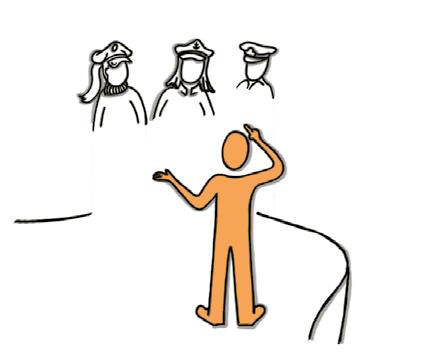
To reflect your motivation, consider these questions:
– Whose idea was it to do a doctorate?
– Does my motivation justify the time and effort needed?
– How else might I pursue my ambitions and motivations?
Your second step should be to develop a realistic idea of what a doctorate in your chosen field involves. This will help you determine whether you are able to activate the intellectual, personal, financial and social resources needed to pursue and complete a PhD.
Time
– How much time does a PhD typically require in this research field?
– Am I able and willing to invest this time?
– What would it mean if my PhD took longer than envisaged?
– How old will I be when I earn my doctorate? What does this mean for my professional opportunities?
– What other responsibilities do I need or want to fulfil during my PhD?
Funding
– Which living expenses plus PhD-related costs will I be facing, such as travel, matriculation, publishing, etc.?
– How will I fund my PhD?
– Am I willing to accept the financial constraints of holding a PhD position?
– What will be my living standard during the PhD?
Sustainable self-leadership
– Can I work independently, organise my ideas and adhere to a work plan and timetable?
– Which coping strategies can I activate, especially during difficult periods?
– How easily do I find asking others for support?
Before applying for a PhD position, candidates are advised to define their expectations about their envisaged PhD project and their prospective PhD position. Clear expectations on both sides help make an informed decision regarding a “good fit” for the PhD project.
Expectations about the PhD project
– Will I be able to define my research topic independently, or will my doctorate be part of a larger project?
– How much scope do I have (and will I need) to reshape my project?
– How much interest and support do I expect from my supervisor?
– Is my doctorate oriented towards an academic career or towards practice?
– Do the expected project outcomes match my aims?
Expectations about the PhD position (internal PhDs)
– Which tasks will I be expected to perform during my contract? Am I genuinely interested in those tasks?
– How much work time per year is (approximately) earmarked for each task? Is this how I want to be spending my time?
– How will working on my PhD and on other tasks be balanced? How feasible is this balance?
– How much flexibility and freedom do I need?
– Do I understand my professor’s working style? How well does it match mine?
Expectations about the PhD position (external PhDs)
– How compatible is my job with academic work? Will I have enough time?
– Is part-time work possible if necessary?
– How much does my employer support my goal of doing a doctorate?
– How can I find my academic peer group or network?
– If I am not employed as a PhD student, how will I fund my PhD?
Before dedicating to a PhD, we advise candidates to check the available resources of their superiors and at their future institute or chair. Make sure to check if the conditions are adequate for you to begin a PhD. Also, it makes sense to get a sincere and critical appraisal of the supervisor’s assessment of your aptitude to complete a PhD and potential challenges to prevent future disappointment.
Questions to consider in the PhD interview
– Which support can I expect?
– How many PhD students does my potential supervisor have?
– How has this supervisor dealt with previous PhD candidates?
– How much supervision time can I expect? Is there a tradition of regular research colloquia at my institute?
– Are there any extended absences scheduled, like sabbaticals or guest visits, which might significantly affect the supervisor's ability to support the PhD process?
– How much additional knowledge (methodological, theoretical and subject-specific) will I need to gain to develop a viable PhD project?
Try to gain as much insight into the academic work environment before you enrol in a PhD or, in the case of internal PhD candidates, take on the project. Consider asking past or present PhD students about their experiences. You might also request spending a trial day at your prospective workplace. International students should also explore the city of St.Gallen and consider what relocating to Switzerland might involve in terms of culture, establishing new social networks and pursuing leisure activities.
In the case of internal PhDs candidates, discussing expectations early on, if possible, before signing a job contract helps avoid disappointment and conflict.
What to clarify before signing a PhD contract
– What is considered work time and what is not?
– How will overtime be compensated?
– What does the contractually stipulated workload (e.g. 50% or 100%) mean in practice?
– How far is the position oriented towards basic or applied research? How much paid time may candidates devote to their PhD?
– What are the rules for home office work?
– What kind of support will the PhD supervisor provide?
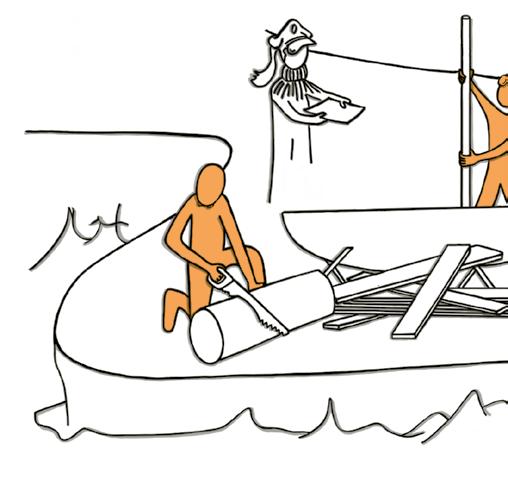
Phase orientation and academic socialisation are crucial to the PhD process. Active in-depth orientation enables candidates to understand which skills they need to develop to execute their project plan. Early orientation can prevent unnecessary frustration and maladjustments, which often only emerge later in the process.
Your doctoral programme will require you to take some courses and seminars, while you may be able to choose others. Take the time to find the right courses for yourself and your project! Discuss your choices with your supervisor, who often has a good overview of what might be helpful for your research.

Phase the end of the coursework phase, candidates should know what they need to complete their PhD studies. Essentially, a PhD project should be specific and focused enough to ensure feasibility and completion. Moreover, it should make a clear contribution to a scientific field. Thus, while practical considerations may be motivating you, bear in mind that your project must also contribute to a narrowly defined academic debate.
Thus, your research proposal should demonstrate the feasibility of your envisaged research. It provides a project roadmap and thus marks an important milestone in your PhD process. This stage helps to understand how and under which conditions you can best complete your doctorate. The research proposal can be accepted by the dissertation committee, returned for revision or definitively rejected. An accepted research proposal means you are on the right track with your PhD project.
Please consider that PhD candidates and their supervisors need to agree on various issues:
– How can the doctorate be divided into more manageable and executable steps?
– What are the pros and cons of writing a monograph or a cumulative thesis (publishing a series of articles)?
– Which criteria apply to co-authored publications?
– How will my co-supervisor or committee of supervisors be appointed? How will they be involved?
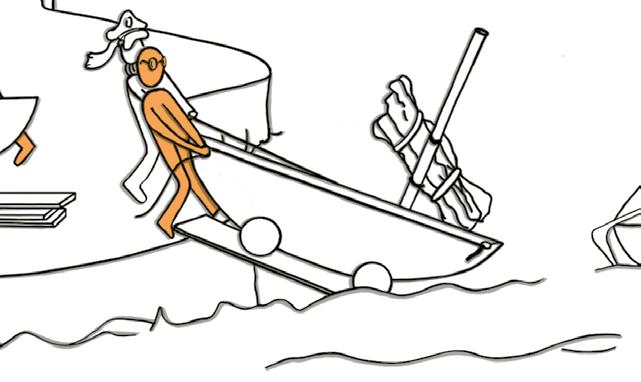
Having defended the research proposal marks the transition to a more autonomous phase of the doctoral process. In this stage, candidates need to deepen their research interests, collect and analyse data, and develop their own perspectives and expertise.
One of the common challenges candidates face in this stage is transposing their ideas, insights and contributions into coherent writing and testing their ideas beyond institutional confines. Even if candidates shape their journey more independently at this stage, they still need to regularly discuss important decisions and challenges with their supervisors, also as a means of gaining reassurance. Thus, establishing supervisor-candidate interaction, best described as “freedom within boundaries,” is an important step in this phase of the PhD process.
Complex challenges, familiar to most academics, may emerge during the thesis phase. To overcome these, we advise you to seek support early on. Giving and accepting support in the form of feedback, as well as providing scope for reflection and creativity, has become essential in modern academic life.

Your PhD project may temporarily hit a "dead end." This may happen for various reasons (e.g. becoming so entangled with your material that you lose sight of the "big picture" or your envisaged approach proves unfeasible, etc.). This may create negative dynamics: Your problem-solving might produce "more-of-the-same outcomes" rather than help overcome the deadlock. As with all complex problems, regularly discussing project feasibility and one's underlying assumptions may prove beneficial. Sharing your feeling of "being stuck" with your supervisor will allow him or her to step into their supervisory role and help you develop an effective problem-solving strategy, something many supervisors are especially good at and enjoy doing.
Finally, if self-doubt, procrastination, excessive nervousness or disenchantment hinder you from working on your thesis, psychological counselling may help you overcome writer's block and react to your resources.
Perfectionism and over-ambition may deplete your resources and lead to frustration. Remember that a PhD only marks the beginning of an academic career and that the key aspect is “learning the ropes”. i.e. finding out how things are done and developing the necessary skills to do them. Moreover, perfectionism and over-ambition are often triggered by anxieties of falling short and can lead to procrastination. Should you find yourself in such a situation, two things might help: Firstly, allowing yourself to write “messy drafts” and separating the editing from the writing process and secondly, putting aside the idea that texts need to be perfect before sharing them with others. In practice, sharing early drafts and preliminary versions in colloquia or among peers enhances your learning process.
Even when delivered in the most appreciative way, feedback may be hard to accept and trigger strong defensiveness. As feedback is paramount to academic sustainability, not being able to accept feedback may jeopardise the progress of your project. As a PhD student, you need to learn how to receive and deal with “bad” feedback. For example, even if feedback may be missing the point, it may help you consider which parts of your thesis still need more work.
Sharing temporary problems (e.g., writer’s block, emotional struggles or an impasse) may require courage. However, this is often the first and crucial step to effectively dealing with the problem. If you are struggling, activate your social resources to ensure you receive instrumental, practical and emotional support.
Reaching out to your supervisor for advice and support may prove immensely helpful. It may also initiate fruitful discussions on developing a structured path out of your deadlock. Supervisors have tried and tested resources and proven experience in this respect.
The University offers various counselling services. These provide students and supervisors with expert support in difficult situations. In case of doubt, it is essential to access these services as resources — sooner rather than later.
PhD students often discover that the final stage of their PhD requires considerable energy to write, rework and edit their thesis.
It is essential that you maintain a good balance between the various areas of your life throughout your PhD process. Take enough time to satisfy your physical and social needs, also during the final stages of your PhD. This helps to free up your mind, re-energise your body and soul, and keep up your motivation. Maintaining a healthy distance from your PhD will help you see the whole picture and regulate your emotions towards it. Most importantly, sleep enough, as even a slight sleep deprivation can have a big impact on your quality of life, ability to make good decisions and academic performance.
Balancing various demands and early planning is crucial to ensuring project completion. Your supervisors may ease the burden on you, for instance, by renegotiating your workload or temporarily relieving you of certain duties at your institute or chair.
Another common problem for PhD students at this stage is recognising the value of their contribution. This sometimes proves difficult as you have been pursuing your project for a considerable length of time. Helpful ways of seeing the big picture (especially if you feel you have lost overview) include elevator pitches, drafting abstracts and telling the story to someone unfamiliar with the topic. Let others help you identify your contributions if you cannot recognise them or consider them too trivial.
The very last steps also need planning. It helps to ask your supervisor how and when they can comment on draft chapters or the whole manuscript. Establish how much time your supervisor needs to give you feedback. Also, be sure to contact the PhD Office about official procedures and deadlines.
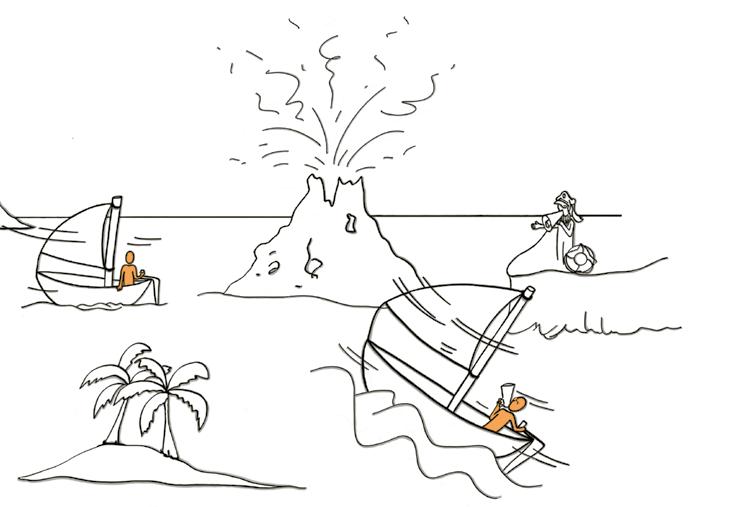
Regarding submission, you need to clearly understand the institutional process, especially the deadlines for PhD thesis. Once the thesis is drafted and officially submitted, there are still a few things that need to be done before you are able to receive the PhD degree. For many, the time between submitting the PhD thesis and the PhD ceremony feels surprisingly long and can factually last up to one year or, in some cases, even longer.
After officially handing in a thesis at the University of St.Gallen, it undergoes several successive steps:
– First, the thesis is checked for plagiarism and if it meets the formal criteria.
– Secondly, the thesis is assessed by the thesis committee, which can reject the PhD, send it back for revisions, accept the PhD with minor revisions or accept the PhD as it is.
– In the case the PhD is accepted, the third step is to defend the PhD before the PhD committee. The PhD defence can be public, and you may consider inviting colleagues, friends and family to provide social support and celebrate the milestone of successfully completing all the official requirements needed to obtain a PhD degree.
– In the fourth step, the programme committee must formally approve the thesis committee’s recommendation.
– Finally, the thesis needs to be printed or published, and sufficient copies must be submitted to the HSG library.
Many PhD students find it hard to anticipate what they can and want to do after the PhD before they defend the PhD, as all their energy is directed towards completing the thesis in the best possible way. Once the PhD thesis is defended, attention can increasingly be directed towards the next steps after completing your PhD. As there is often some time between the defence and the official graduation ceremony, we suggest you meet with your supervisors to discuss your academic potential or your professional skill set. You may receive invaluable hints for your next career decision! Such a meeting will offer you and your supervisor an opportunity to reflect on the PhD process and learn from it!
Completing your PhD is a remarkable achievement. The university's graduation ceremony marks the official transition from PhD candidate to PhD, creating a memorable moment for you, your guests and your PhD supervisor. Moreover, we suggest that taking the time to sufficiently celebrate this accomplishment with all those who supported you is an essential and especially enjoyable part of concluding the PhD journey.
On a final note, consider that the main long-term worth of the PhD journey may lie beyond the achievement of gaining a PhD degree. The knowledge and experience of _how_ you have overcome challenges, endured strenuous times, built strong professional relationships and mastered an academic craft can serve as crucial resources in your future endeavours.
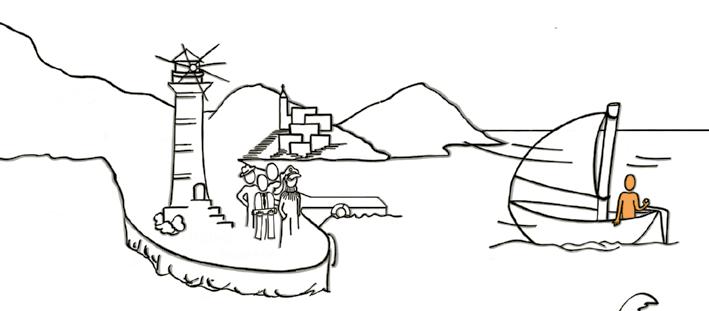
Universität St.Gallen (HSG)
Dufourstrasse 50
9000 St.Gallen
+41 71 224 21 11 info@unisg.ch unisg.ch
Imprint
© 2024 University of St.Gallen (HSG)
Published by | Office of the President, University of St.Gallen
Authors | Florian Schulz, Katharina Molterer
Layout concept | Fiorella Schmucki
Graphic designers | Marcel Bischof, St.Gallen
Illustrations | Susanne Alpers
Printed by | Typotron AG, St.Gallen
Print run | 1000 copies
This information may be freely used and copied for non-commercial purposes, provided tthat due acknowledgement of the source is given.
From insight to impact.